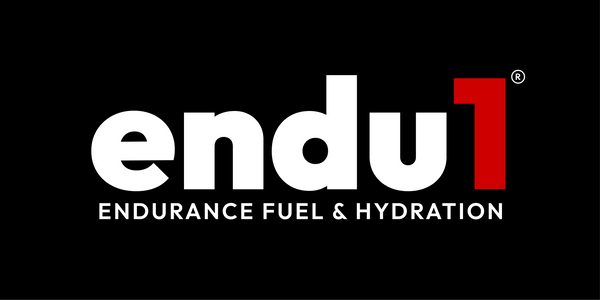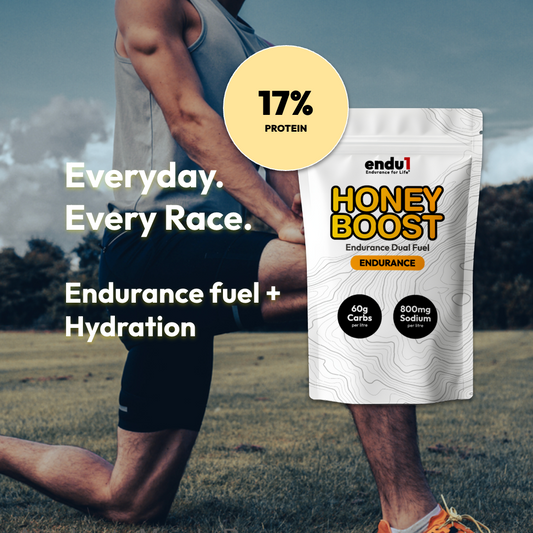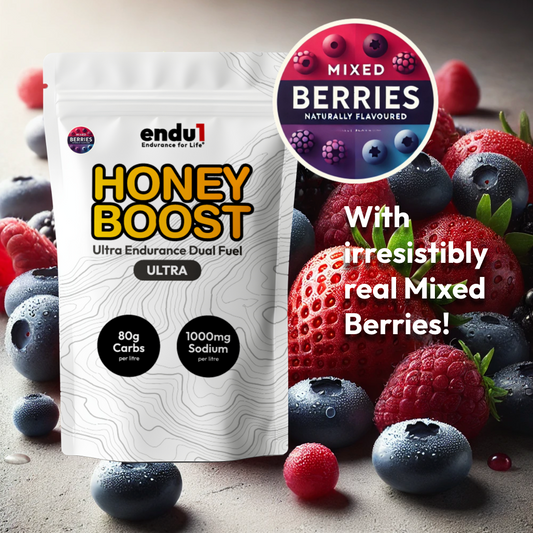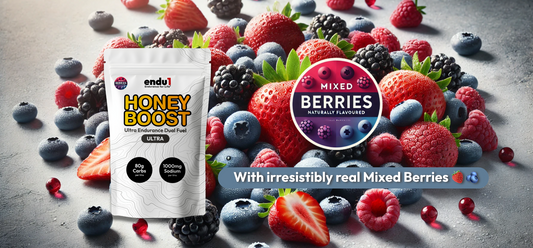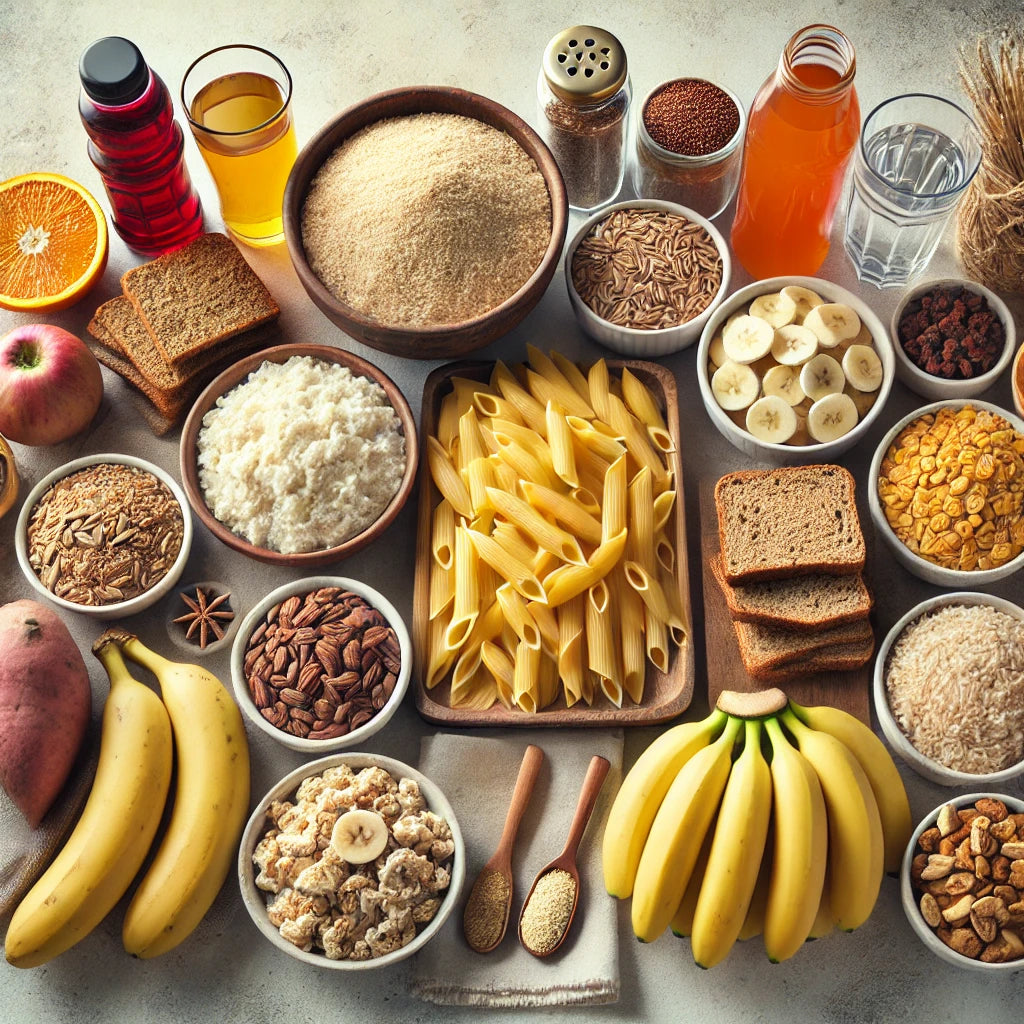
The Ultimate Guide to Carb Loading: What to Eat, What to Avoid, and How to Fuel Your Endurance Race
Share
Why is carb loading important? What is it? What foods should I eat or avoid? How much should I eat? When should I start?
These are all common questions for endurance athletes.
Why is carb loading important?
Carb loading is important for endurance athletes because it maximises glycogen stores in the muscles and liver, providing a readily available source of energy during prolonged physical activity. Here's why it matters:
1. Maximises Energy Reserves
Carbohydrates are the body’s primary fuel source during endurance events. By increasing your carb intake before the event, you enhance the amount of glycogen stored in your muscles and liver. This ensures a larger energy reserve to help sustain you through longer bouts of exercise.
2. Delays Fatigue
When glycogen stores are depleted, the body shifts to burning fat, which is less efficient and leads to a noticeable drop in performance. Carb loading delays the point at which your glycogen stores run out, allowing you to maintain a higher intensity for a longer period without feeling fatigued as quickly.
3. Improves Performance
Studies show that athletes who properly carb load can improve their endurance and performance in events lasting longer than 90 minutes. By having sufficient glycogen, you can avoid "hitting the wall" or experiencing a sudden loss of energy, which is common in long races or endurance activities.
4. Helps Maintain Mental Focus
Carbohydrates are also important for brain function. By ensuring you have enough glycogen, you maintain better mental clarity and focus during the race, which can help with decision-making, pace setting, and staying motivated.
5. Supports Faster Recovery
Having higher glycogen levels during exercise can reduce muscle damage and improve recovery after the event. When glycogen is available, your body is less likely to break down muscle tissue for energy, which can lead to quicker recovery and less post-race soreness.
Carb loading helps athletes by providing sustained energy, improving performance, delaying fatigue, and promoting faster recovery, all of which are critical for success in endurance sports.
What should I eat for carb loading? / What foods are great for carb loading?

Carb loading is essential for maximising glycogen stores before an endurance event. Here are some great foods to include in your pre-race carb-loading meals:
- Pasta – A classic carb-loading staple, whole-grain or white pasta is packed with easily digestible carbohydrates.
- Rice – Both white and brown rice provide a good source of carbs, with white rice being easier to digest.
- Oatmeal – Provides complex carbs and can be easily customised with fruit or honey for extra carbs.
- Bread – Whole wheat or white bread, especially in the form of bagels, rolls, or toast, are great for quick carbs.
- Potatoes – White or sweet potatoes offer a high-carb content, along with beneficial vitamins and minerals.
- Quinoa – A high-carb, nutrient-dense grain that’s also gluten-free and provides some protein.
- Fruits – Bananas, apples, oranges, and dried fruits like raisins or dates offer quick-digesting carbs and natural sugars.
- Pancakes or waffles – Light and easy to digest, especially when topped with honey or syrup.
- Couscous – A light and quick-cooking carb source that can be paired with veggies or proteins.
- Sports drinks or carb supplements – These can be a convenient option for boosting carb intake with easily digestible sugars. For example, we recommend taking either Endu1 Honey Boost Endurance or Endu1 Honey Boost ULTRA to optimise your carb storage, while ensuring you have ample electrolytes (especially salt/sodium) in your body.
What foods should I try to avoid during carb loading?
When preparing for an endurance event, it's important to avoid foods that could negatively impact digestion, cause discomfort, or interfere with glycogen storage. Here are foods to avoid during carb-loading and in the days leading up to the event

- High-Fat Foods – Avoid fried foods, heavy sauces, butter, and fatty meats as they can slow digestion and cause bloating or discomfort.
- High-Fiber Foods – Foods rich in fiber, such as beans, lentils, cruciferous vegetables (broccoli, cauliflower), and whole grains with high bran content, can lead to gas, bloating, and an upset stomach.
- Spicy Foods – Spicy dishes can irritate your digestive system, causing heartburn or stomach discomfort, which is the last thing you want before a race.
- Dairy Products – If you're lactose intolerant or sensitive to dairy, it's best to avoid milk, cheese, and yogurt, as they can cause gastrointestinal distress.
- Sugary or High-Processed Foods – While some sugars are okay for quick carb intake, too many processed sweets (like candies, pastries, or cookies) can lead to energy crashes, and they often lack the necessary nutrients for proper fuelling.
- Alcohol – Alcohol can dehydrate the body and interfere with proper glycogen storage, impairing performance during the event.
- Large Portions of Protein – Protein is important but not the focus of carb-loading. Large amounts of protein can be harder to digest and divert energy from carb storage.
- New or Unfamiliar Foods – Avoid experimenting with new foods that your body isn’t used to, as they may cause unexpected digestive issues.
Focusing on easily digestible carbs and minimising foods that slow digestion or irritate the gut will help ensure optimal performance on race day.
When should I start carb loading? Should I begin earlier or closer to race day?
Carb loading typically begins 1 to 3 days before an endurance event, depending on its length and intensity. The goal is to maximise your muscle glycogen stores, ensuring you have enough energy for sustained performance.
Here’s a general timeline for carb loading:
3 Days Before the Event:
- Gradually increase your carbohydrate intake to around 70-80% of your total daily calories.
- Focus on easily digestible carbs like pasta, rice, bread, and fruits.
- Reduce your training volume to allow glycogen stores to replenish.
1-2 Days Before the Event:
- Continue eating high-carb meals, but reduce fiber, fat, and protein to avoid digestive discomfort.
- Avoid intense or long-duration workouts to prevent glycogen depletion.
- Hydrate adequately, as water helps store glycogen.
Night Before the Event:
- Have a high-carb, low-fiber dinner. Aim for something easy to digest like white pasta or rice with a light sauce.
- Avoid heavy, greasy, or spicy foods that may cause digestive issues.
Morning of the Event (3-4 hours before):
- Eat a final pre-race meal with easily digestible carbs (e.g., oatmeal, toast with honey, or a banana) to top off your glycogen stores.
Starting carb loading a couple of days before the event gives your body ample time to fully store glycogen without feeling bloated or sluggish. To work out how much carbs/calories you will need daily, check out the link below.
How to Calculate Daily Calorie and Carbohydrate Needs for an Endurance Athlete
By following this carb loading guideline, your body should have sufficient carbs stored to help fuel your race in the early stages.
Remember to ensure you maintain adequate carb intake throughout the race. You can check out below:
Why Early Carb Intake is Key to Ultra Marathon Performance
Have fun and Good Luck to your race (e.g. Surf Coast Century, Run Prix Melbourne)!
If you want to perfect your nutrition plan down to the finest details, we recommend contacting one of our sports nutritionists listed below:
Contact Isobel Tait from Peak Endurance Coaching
